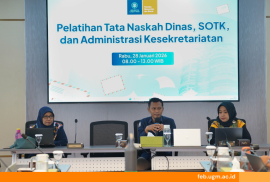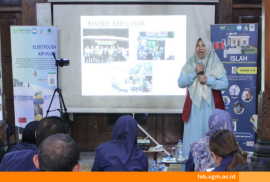On Friday (8/5) Faculty of Economics and Business (FEB) UGM held a public lecture with the theme, “Inclusive Growth: How to Promote It?”. Speakers of this event was Kalpana Kochhar (Deputy Director, Asia and Pacific Department of the IMF), and the
moderator is M. Edhie Purnawan (Lecturer of FEB UGM). This event lasted two hours, and was held in Kertanegara Room.
The trend of technological change, globalization, and increasing labor force has led to rising welfare and global growth. Many emerging market and developing countries experienced rapid growth. Developed countries earned more benefit from lower prices of commodity. Unfortunately, this trend has contributed in generating income gap among people within these countries. Between the poor and the rich in the countries separated by a large gap. For developing countries, the solution offered is to improve the quality of education, health, and access to finance. As for developed countries, the solution is with financial globalization and increased labor skills.
Growth in emerging markets in the 2000s managed to outpace the growth in advanced markets. This is because many trading partners and the development of the supply chain that is owned by emerging markets, and external funding is readily available. Unfortunately after the global financial crisis, growth in emerging markets has decreased. Rules can be created to sustain growth in emerging markets: structural reforms and increasing participation in the labor market.
Sumber: Arlina/FEB




